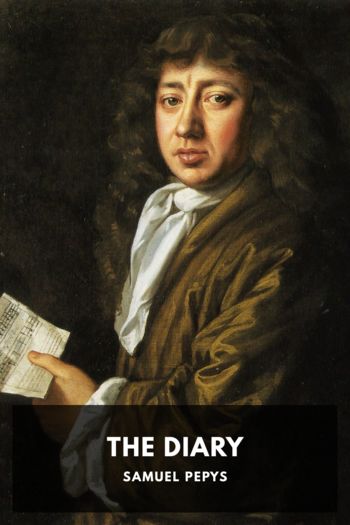The Diary, Samuel Pepys [e reader books TXT] 📗

- Author: Samuel Pepys
Book online «The Diary, Samuel Pepys [e reader books TXT] 📗». Author Samuel Pepys
John Vaughan, appointed Chief Justice of the Common Pleas, and knighted, 1668. He died December 10th, 1674. ↩
Apparently an allusion to the charming poem attributed to Sir Edward Dyer, the friend of Spenser and Sidney:
“My minde to me a kingdome is,
Such perfect joy therein I finde.”
It was set to music by the celebrated William Byrd, and published in his Psalmes, Sonets, and Songs of Sadness and Pietie, 1588. A black-letter edition of this poem is found in the Pepys Collection of Ballads. ↩
James Norman, clerk to Sir William Batten. ↩
Sir Thomas Chamberlayne. ↩
These ships may have been the Adventure and the Providence, which were ready to launch at this time (see Calendar of State Papers, Domestic, 1663–64, p. 499). ↩
Elizabeth, daughter of John Savage, second Earl Rivers, and first wife to William, fourth Lord Petre, who was, in 1678, impeached by the Commons of high treason, and died under confinement in the Tower, January 5th, 1683, s. p. —B. ↩
There are several references to a new ship building about this time at Woolwich among the State Papers. On February 29th, 1663–64, Commissioner Pett, writing to Pepys, expresses his opinion that “the demands of joiners and caners for work on the new ship at Woolwich [are] exorbitant” (Calendar, Domestic, 1663–64, p. 498). ↩
W. Joyce’s business. ↩
Only son of Sir Willoughby Hickman, of Gainsborough, who had been created a baronet in 1643, and whom he succeeded in his title and estates. He was M.P. for East Retford. —B. ↩
April 5th, 1664. In compliance with the king’s expressed wish “the House immediately set about repealing the obnoxious Triennial Bill, which they stigmatized as derogatory to the prerogative of the Crown, and as a short compensation prepared another short one, which provided that parliaments should not be intermitted above three years” (Cobbett’s Parliamentary History, vol. iv, col. 292). ↩
The two sisters Fenner were married to the two brothers Joyce: Kate to Anthony, and Mary to William. There is a token extant of Anthony Joyce’s house (The Three Stags) “at Hoborn Conded.” The initials “A K I” on the token stand for Anthony and Kate Joyce (see Boyne’s Tokens, ed. Williamson, vol. i, p. 633). ↩
The African or Guinea Company, which had a house in Broad Street. ↩
Among the State Papers is a petition of Thomas Staine to the Navy Commissioners “for employment as plateworker in one or two dockyards. Has incurred ill-will by discovering abuses in the great rates given by the king for several things in the said trade. Begs the appointment, whereby it will be seen who does the work best and cheapest, otherwise he and all others will be discouraged from discovering abuses in future, with order thereon for a share of the work to be given to him” (“Calendar,” Domestic, 1663–64, p. 395) ↩
Buns or teacakes. See March 6th, 1660–61.
“Eschaudé, a kind of wigg or symnell.”
Cotgrave↩
These notebooks referred to in the Diary are not known to exist now. ↩
Mithridate is understood to denote an antidote, and not, as here, an opiate. ↩
Pepys had been mistaken in fancying that Fuller’s Worthies was to be a history of all the families in England (see ante, January 22nd, 1660–61, and February 10th, 1661–62), and hence his disappointment, when the work came out, some months after the author’s decease, at there being no mention in it of his ancestors. He then looked for the Cliffords, in hopes of finding his wife’s lineage; but with no better success. —B. ↩
Thomas Hill, a man whose taste for music caused him to be a very acceptable companion to Pepys. In January, 1664–65, he became assistant to the secretary of the Prize Office. ↩
Michael De Ruyter, the Dutch admiral, was born 1607. He served under Tromp in the war against England in 1653, and was Lieutenant Admiral General of Holland in 1665. He died April 26th, 1676, of wounds received in a battle with the French off Syracuse. Among the State Papers is a news letter (dated July 14th, 1664) containing information as to the views of the Dutch respecting a war with England. “They are preparing many ships, and raising 6,000 men, and have no doubt of conquering by sea.” “A wise man says the States know how to master England by sending moneys into Scotland for them to rebel, and also to the discontented in England, so as to place the King in the same straits as his father was, and bring him to agree with Holland” (Calendar, 1663–64, p. 642). ↩
William Bodham about this time was appointed clerk of the Ropeyard at Woolwich. ↩
These demonstrations by Robert Hooke at the Royal Society are described in the minutes as follows:
“April 6, 1664. The experiment of stretching glass was made by Mr. Hooke, who was desired to give an account of the manner and success thereof in writing.”
“April 13. An account in writing was brought by Mr. Hooke of two experiments tried before the Society at the preceding meeting … 2 of the stretching and shrinking of glass upon heating and cooling; both of which were ordered to be registered.”
Birch’s History of the Royal Society, vol. i, pp. 409, 411↩
A long straight-necked glass vessel used for chemical distillation.





Comments (0)